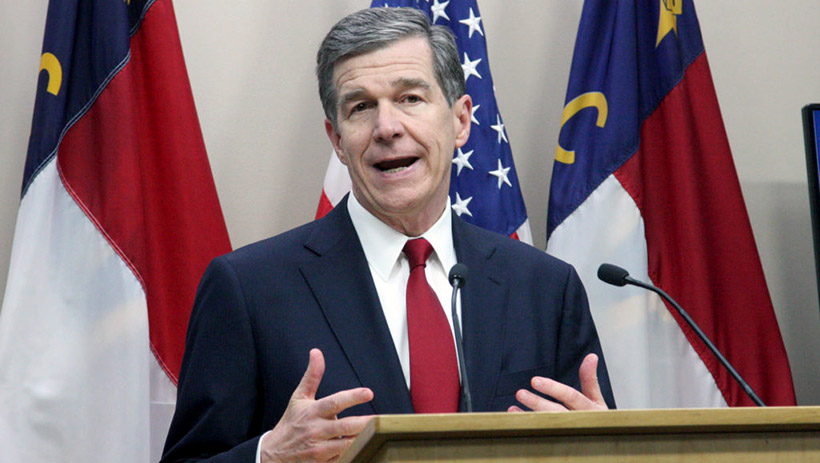Publisher's note: This post appears here courtesy of the Carolina Journal, and written by Jon Sanders.

On St. Patrick's Day, Gov. Roy Cooper issued an
executive order, and the biggest item in the order was shutting down all bars and sit-down rsestaurants effective 5 p.m. that same day. It limited the sale of food and beverages throughout the state to
"carry-out, drive-through, and delivery only."
The order is a profoundly damaging use of executive authority, immediately sweeping out of work a large segment of workers and businesses across the state. But - given the perils of the COVID-19 epidemic - could it also have been necessary?
Was Cooper's shutdown the right policy response?
As of now there is no way of knowing for sure. This is an extraordinary time, and in the fog of war, as it were, leaders have to make decisions with imperfect information.
Knowing that, we should be able to make allowances for potential missteps made in good faith. But we should also never forget we are a free state governed by the rule of law, not men. That's why the N.C. Emergency Management Act makes it clear that, under a declared state of emergency, the governor can exercise his expanded powers only
"with the concurrence of the Council of State" (see
G.S. 166A-19.30(b)).
That way, before the governor makes his call, other statewide elected officials are persuaded that it's probably not the wrong call in an emergency.
Premature announcement leads to a hasty rewrite?
Here, however, regardless of whether his choice turns out to be the right call,
Cooper acted precipitously. He ruled unilaterally,
despite not getting concurrence from a majority of the Council of State as required by law.
Cooper announced his March 17 order at
10:31 a.m. He didn't seek concurrence from members of the Council of State until over two hours later. His office didn't notify them of the items in the executive order until 12:42 p.m., asking for their concurrence by 1:15 p.m., a mere half hour later. He had a scheduled press conference to announce it at 2 p.m.
Cooper hadn't received answers from six members of the Council of State by the time his press conference started. He announced the order anyway.
It turned out the majority of other leaders making decisions in the fog of war were not in agreement over shutting down restaurants and bars.
Was the Council of State's majority vote against Cooper's shutdown the right policy response?
Again, as of now there is no way of knowing for sure.
What we do know is that the Council of State opposed shutting down restaurants and bars
6-3 (and one of those three votes was the governor's). Joining him were Attorney General Josh Stein and Secretary of State Elaine Marshall.
Lt. Gov. Dan Forest did not concur but instead requested the order strongly encourage restaurants and bars limit their operations as opposed to shut them down completely:
- I believe there should be flexibility for restaurants & other establishments. I would strongly encourage them to move to take-out and delivery only. We are talking here about shutting down a large swath of business across this state by executive action.
State Treasurer Dale Folwell and Insurance Commissioner Mike Causey wanted more discussion. Folwell also said the order should encourage restaurants and bars to limit their operations but not mandate they shut down:
[The executive order] should highly encourage these limitations on operations, NOT mandate them. The eating establishments that I frequent are two steps ahead. We should honor their tough decisions and the common sense of North Carolinian's. (Not to mention the total disruption of the LARGEST component of North Carolina's economy).
Both Forest and Folwell wrote about how much of the state's economy would be impacted by a shutdown. As of this writing, the state Division of Employment Security reported receiving nearly 200,000 applications for unemployment insurance benefits. Roughly 88% of the requests were related to COVID-19.
Forest, Folwell, Causey, Labor Commissioner Cherie Berry, Agriculture Commissioner Steve Troxler, and Superintendent of Public Instruction Mark Johnson all voted not to concur with the shutdown.
That afternoon, Lt. Gov. Dan Forest issued a
press release challenging Cooper's legal authority to issue the order. It highlighted the majority against concurrence over the shutdown.
Cooper's order
did not get posted on the governor's web site by 5 p.m., when it was supposed to be in effect. When it was finally posted sometime after 6 p.m., its text did not base the restaurant and bar shutdowns portion on G.S. 166A-19.30(b).
Instead, Cooper's order based the restaurant and bar shutdowns on very broad readings of public-health laws that give the secretary of Health and Human Services or a local health director the power to abate an imminent hazard (
G.S. 130A-20(a)) and the state Health director or a local health director quarantine authority (
G.S. 130A-145(a)).
Why? To date, none of the other restrictions in the governor's COVID-19 Executive Orders strays outside of G.S. 166A-19.30(b). The very fact Cooper
requested concurrence from Council of State members on the restaurant and bar shutdowns makes it plain he knew that's where he drew his authority. Not from statutes concerning localized hazard abatements or quarantines.
Why was the governor's order so late in publication, despite being announced at 10:31 in the morning? I don't know, but I think this is likely:
When Forest made it public that Cooper had no legal basis for his shutdown of restaurants and bars, which Cooper had already publicly announced to the press, the governor's office launched into a desperate, face-saving rewrite, cramming in an extremely generous interpretation of other state laws to try to justify it instead.
The moral of the story
The threat of a pandemic doesn't mean we allow the government to assume greater emergency powers than the law already allows. This, too, is a threat.
Jon Sanders (@jonpsanders) is director of regulatory studies at the John Locke Foundation.























